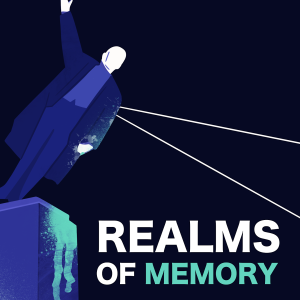Episodes

Tuesday Dec 17, 2024
Tuesday Dec 17, 2024
In 1964 three young civil rights workers were brutally murdered in Neshoba County Mississippi for their participation in the Freedom Summer voter registration campaign. How did the white community silence this past while local African Americans kept it alive? Why did both white and black Neboba Countians ultimately come together to organize two commemorations of these murders with very different outcomes? Find out from Furman University Professor Claire Whitlinger on the January 7th episode of Realms of Memory.

Tuesday Dec 03, 2024
Tuesday Dec 03, 2024
For decades the Cold War border between East and West Germany was one of the most militarized places on the planet. Hundreds of East Germans died and thousands more were imprisoned in their attempts to cross it. How did this former death strip become Germany’s largest conservation zone, known as the Green Belt? How did memory become a core feature of the Green Belt and how can mnemonic, or memory strategies, found in the Green Belt help make conservation work more meaningful and lasting? This is the focus of Bates College Environmental Studies Professor Sonja Pieck’s book Mnemonic Ecologies: Memory and Nature Conservation Along the Former Iron Curtain. Episode logo courtesy of Thomas Stephan ©/Thomas Stephan/mail@thomas-stephan.com

Tuesday Nov 19, 2024
Tuesday Nov 19, 2024
How did the death strip that once separated East and West Germany become the country’s largest protected ecological corridor? Drawing from her recent book, Mnemonic Ecologies: Memory and Nature Conservation Along the Former Iron Curtain, Bates College Environmental Studies Professor Sonja Pieck explains the origins and evolution of what is known as Germany’s Green Belt. In particular she details how conservation and memory work are interwoven in the transformation and revitalization of the former Cold War border that divided Germany. The full episode airs on December 3rd.

Tuesday Nov 05, 2024
Tuesday Nov 05, 2024
The Great Depression was perhaps the closest the capitalist system in the United States has ever come to complete collapse. Equally unprecedented was Franklin Roosevelt’s New Deal response which dramatically transformed the relationship between government, capitalism, and the American people. How was it possible that there was no national memorial to Franklin Roosevelt in Washington D.C. until 1997, over fifty years after FDR’s death? The conundrum of the absence of a shared American memory of FDR and the New Deal response to the Great Depression is the focus of University of Mississippi historian Darren E. Grem’s book project, Hard Times USA: The Great Depression and New Deal in American Memory.

Tuesday Oct 15, 2024
Tuesday Oct 15, 2024
The Great Depression was one of the most seismic events in modern American history. Equally important was Franklin Roosevelt’s New Deal response to the crisis which dramatically transformed the role played by the government in the United States and the lives of its citizens. Why then is there no shared, collective memory of the New Deal and the Great Depression? Why did it take decades before Franklin Roosevelt was memorialized on the national stage in Washington DC? In his book project, Hard Times USA: The Great Depression and New Deal in American Memory, University of Mississippi historian Darren E. Grem explores the remembering and forgetting of this traumatic chapter and why it matters in the present. Tune in on November 5th for my conversation with Darren E. Grem.

Tuesday Oct 01, 2024
Tuesday Oct 01, 2024
Author, co-author, and co-editor of over twenty books on the history of Ukraine, Georgiy Kaisanov has devoted much of his attention to the study of memory politics. In Memory Crash: The Politics of History in and around Ukraine 1980s-2010s, he reveals how Ukrainian history is based on a revamped, century-old, ethnonationalist history that excludes and alienates a significant part of the population. Moreover, he highlights the unplanned, haphazard approach to the past driven by the actions and responses of particular interest groups seeking influence and advantage. Rather than galvanizing the will of the people and harnessing the collective spirit of the nation, the past has been a battlefield that has divided more than united Ukrainians.

Tuesday Sep 17, 2024
Tuesday Sep 17, 2024
Memories of the past have been central to the process of nation-state building in Ukraine. Rather than starting anew after the collapse of the Soviet Union, Ukrainians dusted off a hundred year old ethnic-nationalist history and applied it wholesale to the present. In Memory Crash: The Politics of History in and around Ukraine 1980s-2010, historian Georgiy Kasianov argues that the consequences of the uses of the past have been disastrous. Rather than forging strong ties to the nation across a culturally diverse population, minority populations have been ignored and even alienated. For more on the politics of memory in Ukraine past listen to the October 1st episode of Realms of Memory.

Tuesday Sep 03, 2024
Tuesday Sep 03, 2024
Make America Great Again, Donald Trump’s 2016 presidential campaign slogan has become synonymous with his entire political movement. MAGA, the acronym, is now a catch phrase used for Trump’s most ardent supporters. Emblazoned on millions of red hats, which Trump himself helped promote, the Make America Great Again slogan lived on, even after Trump’s defeat in the 2020 presidential elections. With its clear reference to better times in the past, what does Make America Great Again actually refer to? How do Trump’s supporters and opponents understand the slogan? What does it reveal about how Americans understand their national past? Find out from historian Matthew Rowley, author of Trump and the Protestant Reaction to Make America Great Again.

Tuesday Aug 20, 2024
Tuesday Aug 20, 2024
Across the political divide Americans view each other with ever deepening sentiments of distrust and suspicion. Historian Matthew Rowley argues that the absence of shared memories of a national past fuels this polarization and the rise of violence in American politics. In Trump and the Protestant Reaction to Make America Great Again, Rowley looks at what the published work of American Protestants from across the political spectrum reveals about the challenges and possibilities of forging a common narrative that could bridge the current divide.

Tuesday Aug 06, 2024
Tuesday Aug 06, 2024
How can the past be turned against its memory keepers? How can the successes and accomplishments of a person or movement be undone by intentionally misremembering and distorting the past? University of Southern California sociologist Hajar Yazdiha argues that this is precisely what’s been happening with the memory of Martin Luther King Jr. and the civil rights movement. Since the Reagan era the memory of this past has been used by diverse actors on the right to roll back the gains of the civil rights movement. The memory of Dr. King has been exploited to further the goals of a wide array of conservative groups. For more, listen to a conversation with Hajar Yazdiha about her book, The Struggle for the People’s King: How Politics Transforms the Memory of the Civil Rights Movement.





